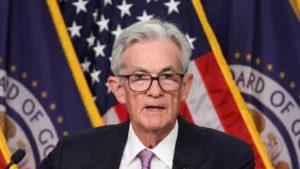
Political uncertainty in markets has caused fluctuations across global financial sectors as the U.S. presidential election unfolds. The heightened sensitivity of financial markets to election outcomes is nothing new, but 2024’s particularly polarized race has triggered notable reactions from investors, influencing stock prices, bond yields, and even commodity markets. Let’s explore how the political uncertainty impacts market sentiment and what investors can expect as results continue to unfold.
Market Reactions to Political Uncertainty
In times of political uncertainty, financial markets often experience increased volatility. This phenomenon arises as investors attempt to predict potential shifts in policy that could impact economic growth, regulation, and business operations. With the 2024 election drawing unprecedented attention, many investors are adopting a cautious approach, hedging their bets in anticipation of potential policy shifts under a new administration.
Political Uncertainty Markets: Sectors Most Affected
Key sectors are being particularly impacted by the election uncertainty, with market fluctuations reflecting investor expectations about future policy changes:
- Energy: The energy sector is sensitive to changes in policies related to climate change, fossil fuel use, and renewable energy incentives. A shift toward green energy initiatives could benefit clean energy stocks but may introduce challenges for traditional oil and gas companies.
- Healthcare: Healthcare stocks are often influenced by election results due to potential shifts in policies regarding healthcare reform, drug pricing, and insurance regulations. Many investors are closely monitoring this sector as potential changes could significantly impact both costs and revenues for companies in this industry.
- Technology: The tech sector could face regulatory adjustments, particularly in areas like data privacy, antitrust laws, and cybersecurity. Changes in government oversight could alter how these companies operate, influencing their stock performance.
Election Uncertainty and Its Impact on Stock Market Volatility
Stock market volatility, measured by indicators like the VIX (Volatility Index), often spikes during election years, reflecting increased unpredictability and investor concern. As votes continue to be counted, the VIX has remained elevated, showing that investors are factoring in a range of potential outcomes and their associated risks.
The VIX, commonly referred to as the “fear gauge,” has shown fluctuations in response to reports from key swing states. Since market participants tend to seek safe-haven assets during periods of uncertainty, this trend is causing shifts in stock prices and prompting increased demand for assets perceived as stable, such as gold and government bonds.
Political Uncertainty Markets: Bond and Safe-Haven Asset Responses
As political uncertainty continues, safe-haven assets are seeing increased demand. Bonds, especially U.S. Treasury bonds, tend to be appealing to investors seeking stability. Gold, a traditional safe haven during volatile periods, has also experienced price fluctuations, as it remains a favored investment during uncertain times. Investors seeking to hedge against inflation or instability are closely watching both assets for cues on future market trends.
Investor Sentiment Amid Political Uncertainty
Investor sentiment plays a crucial role in shaping market trends, particularly when political factors dominate news cycles. During uncertain times, sentiment can vary widely, with some investors staying on the sidelines while others actively adjust their portfolios.
Sentiment is particularly polarized this election, as divergent policies from the candidates create varying degrees of perceived risk and opportunity. The political uncertainty in markets could continue to influence decision-making well into 2024, depending on how smoothly the election process resolves and what changes are ultimately introduced by the new administration.
Political Uncertainty Markets: Economic Indicators to Watch
Certain economic indicators are being watched closely to gauge the potential impacts of the election on markets:
- Interest Rates: The Federal Reserve’s stance on interest rates remains a critical factor, especially as economic conditions remain uncertain. Shifts in monetary policy could impact borrowing costs and investor confidence.
- Unemployment Figures: Employment data provides insight into economic stability, and any changes in labor policies could have lasting effects on job markets and consumer spending, thereby affecting corporate earnings.
- Consumer Confidence: Consumer sentiment is highly influenced by political stability. Low confidence can indicate a reluctance to spend, which can negatively impact sectors like retail and housing.
Strategies for Investors During Political Uncertainty
For investors navigating the current political landscape, a cautious and diversified approach may be advisable. Here are a few strategies to consider in response to political uncertainty in markets:
- Diversification: Diversifying across different asset classes can help mitigate risk, especially in volatile times. By investing in both growth-oriented stocks and defensive sectors like healthcare and utilities, investors may achieve greater stability.
- Focus on Quality Stocks: In times of political turbulence, high-quality stocks with strong financials and stable earnings are typically better able to weather market shifts. Companies with resilient balance sheets and steady cash flows may be less susceptible to volatility.
- Monitor Safe-Haven Assets: Keeping an eye on assets like gold and Treasury bonds can provide a buffer against downturns. These assets historically perform well during periods of high uncertainty and may help stabilize portfolios.
- Stay Informed and Flexible: As political developments unfold, staying informed about potential policy changes is essential. Investors may benefit from flexibility in their portfolios, adjusting asset allocations to adapt to new information.
Potential Outcomes and Market Recovery
If the election results in a clear outcome without prolonged delays or legal battles, markets may experience a brief rally as uncertainty subsides. However, if the results remain contested, the market could see continued volatility until a definitive winner emerges. Regardless of the election’s outcome, the transition period between administrations can create unique market conditions as businesses and investors adjust to new policies.
Political Uncertainty Markets: Longer-Term Effects
Long-term effects of political uncertainty may vary depending on the administration’s policy decisions. Policies on taxation, healthcare, and trade could shape market trajectories well into the next presidential term. Investors are likely to adjust their portfolios as clarity emerges around future regulatory and economic landscapes.
Conclusion: Navigating Political Uncertainty in Markets
The political uncertainty in markets has heightened as the 2024 election remains unresolved, creating fluctuations that affect investor sentiment and asset prices across sectors. For American investors, adopting a cautious approach with an eye on key economic indicators can provide some stability amid the turbulence.
With the stakes higher than ever, understanding the influence of politics on markets is essential. Staying informed and adapting to shifts in policy will be critical for those looking to navigate potential changes and seize opportunities as clarity returns to the financial landscape.


